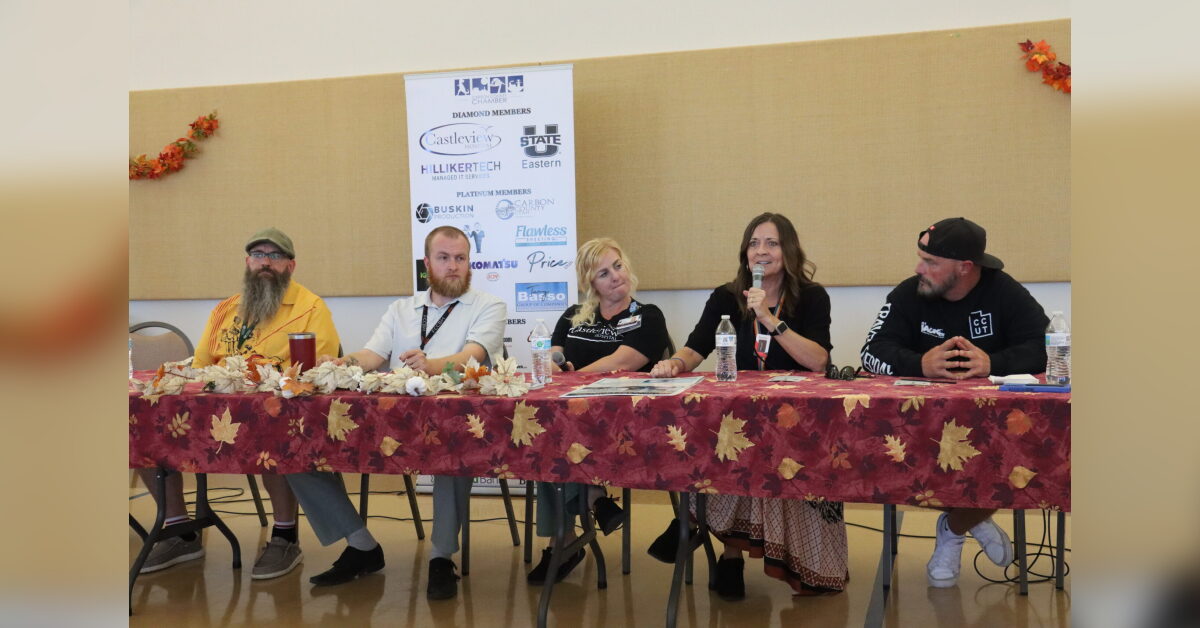PRICE — The Carbon County Chamber of Commerce (CCCC) hosted a luncheon on Sept. 18 at Ascension St. Matthews Church, bringing together a panel of local professionals and individuals in recovery to discuss mental health challenges and available recovery resources in Carbon County.
Panelists included Damon Davis, a peer recovery coach with Utah Support Advocates for Recovery Awareness (USARA); Kelland Brewer, clinical director at Four Corners Community Behavioral Health; Amy Jones, social worker and therapist at Castleview Hospital; Dannette Moynier, a therapist with Carbon Medical Service; and CJ McManus, a local resident living in long-term recovery. The discussion was moderated by CCCC President Scottie Kraync.
The panel focused on the most common mental health issues in the area, including substance use disorder (SUD), anxiety, and depression. Davis emphasized the importance of offering connection and nonjudgmental support to individuals battling SUD. Brewer noted that Four Corners provides crisis therapists to help people navigate immediate challenges and connect them with appropriate treatment. Jones spoke about the need to see individuals as people, not just patients, and to address the root causes of mental health issues, often tied to childhood trauma. Moynier highlighted the overwhelming stress many face today and the importance of offering safe, supportive spaces without judgment. McManus reflected on the long-term effects of the opioid crisis, pointing to overprescription in the 1990s and the growing mental health impact of social media.
Kraync asked each panelist to share one service they wished more people knew about. Davis highlighted USARA’s recovery coaching, which is free and focused entirely on advocacy and support. Brewer promoted Four Corners’ new crisis receiving center, a voluntary and confidential facility open 24/7 to help people during times of crisis.Jones discussed Castleview Hospital’s Bridge Program, which connects patients from the ER to long-term resources. Moynier emphasized the availability of peer support at Carbon Medical Service, where individuals can come in just to talk, no appointment or insurance needed. McManus reflected on the expansion of local resources since 2005, noting the importance of programs like drug court and peer support, and the amount of options that don’t involve handcuffs.
The event also included a community Q&A session.
Amanda Paiz, owner of Marketing Elevated, emphasized the importance of education in reducing stigma and asked what the community can do to better support those in recovery.
Jones encouraged attendance at local events. Moynier suggested businesses evaluate whether they create safe, welcoming environments. McManus advised employers and community members to offer second chances to individuals in recovery and be mindful of how they speak about addiction. Brewer stressed the importance of empathy, vulnerability, and acknowledging that mental health and addiction affect everyone.
Tina Grange, Carbon County’s tourism specialist and film liaison, shared her personal experience supporting a couple struggling with addiction and asked about resources for those trying to help others. Brewer pointed her to family support groups, and Davis described the CRAFT (Community Reinforcement and Family Training) program, which supports families of individuals in active addiction. McManus added that, although it may be difficult, sometimes involving law enforcement is the only way to get a loved one into treatment.
Grange also raised concerns about navigating mental health services beyond the 988 crisis line. Brewer explained that Four Corners is connected with 988 and that individuals can request in-person responses even if the situation is not life-threatening. He stressed that people can walk into any Four Corners facility for help, with no criteria other than needing support.
Paiz also shared information about curetheconversation.org, a website that compiles local mental health and recovery resources that are available in the area.
Jessica Basso Vasquez, who oversees more than 50 employees at SureStay, asked how HR representatives can better support struggling employees, especially those without insurance. Moynier encouraged direct outreach to local providers and said Carbon Medical operates on a sliding scale and raises funds to support individuals in need. Jones added that the HOPE Squad offers three free therapy sessions. Davis said USARA also assists businesses with resources like narcan distribution and training.
Richard Root posed a broader question, asking what led to the current addiction crisis. McManus cited pharmaceutical company practices in the 1990s and early 2000s, which overprescribed opioids like OxyContin. McManus shared that often times individuals were prescribed copious amounts of narcotics for something as simple as a broken ankle. Moynier noted a growing disconnection between families and communities. McManus added that both social media and corporate greed have worsened the crisis. He also mentioned that while legal settlements have been made, the funding does little to repair the widespread harm caused.
Moynier challenged attendees to be safe, trusted adults for the children in their lives, reminding the group that young people need to feel valued and supported.
Lisa Clark, the CEO of Carbon Medical Service, raised concerns about the well-being of peer support staff, especially those in recovery themselves. Mersades Morgan, USARA’s Price Center lead, said that supervision and third-party support are crucial to helping peer staff stay grounded. She emphasized that people often don’t feel comfortable being vulnerable with their direct supervisors. Jones echoed the importance of an open-door policy in the workplace to ensure staff can ask for help when needed.
The luncheon ended with a call for continued collaboration, community engagement and an emphasis on compassion, education, and access to services for individuals navigating mental health and addiction challenges.
Photos by Jamie Swank

